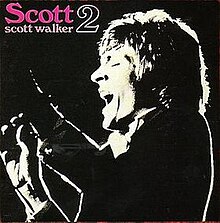Scott 2
| Scott 2 | ||||
|---|---|---|---|---|
 |
||||
| Studio album by Scott Walker | ||||
| Released | March 1968 July 1968 (US) |
|||
| Recorded | 1967-1968 | |||
| Genre | Baroque pop | |||
| Length | 43:47 | |||
| Label |
Philips Smash (US) Fontana (CD) |
|||
| Producer | John Franz | |||
| Scott Walker chronology | ||||
|
||||
| Singles from Scott 2 | ||||
|
||||
| Professional ratings | |
|---|---|
| Review scores | |
| Source | Rating |
| AllMusic | |
| Pitchfork Media | (9.1/10) |
Scott 2 is the second solo album by Scott Walker.
Scott 2 follows the formula of Walker's début release, with a mixture of contemporary covers ("Black Sheep Boy", "The Windows of the World") Jacques Brel interpretations ("Jackie", "Next", "The Girls and the Dogs"), film songs ("Wait Until Dark", "Come Next Spring") and his own original compositions ("The Amorous Humphrey Plugg", "The Girls from the Streets", "Plastic Palace People", "The Bridge"). The content of his own and Brel's material was markedly more risqué than on Scott, with "Jackie", "Next" and "The Girls from the Streets" standing out with themes of sexual tribulations and decadent lifestyles.
According to Jonathan King writing in the liner notes to Scott 2, not long after the album had been completed, Walker described it as the "work of a lazy, self-indulgent man." He added, "Now the nonsense must stop, and the serious business must begin." King continues about Walker: "I have no doubt that many years from now, over a space age dinner of vitamins, [...] he will say: 'Well, the last fifty years have been great fun, but now we must get down to doing something worthwhile.' And he'll mean it."
The album, released on Philips Records in May 1968, reached #1 for one week and stayed in the UK Albums Chart for eighteen weeks. The album was preceded by the single "Jackie" in late 1967. The single met with controversy in the UK because of lyrics like "authentic queers and phony virgins" and drug references. The song was banned by the BBC and was not performed on BBC TV or played on the mainstream radio channels. The song eventually charted at #22.
"A record about real stuff with quite disturbing imagery," remarked Neil Hannon, frontman of The Divine Comedy.
...
Wikipedia
